Discover and learn from the Solidarity Playbook on cybersecurity
Strengthening cybersecurity
With increased digitalisation (international) civil society organisations – (I)CSOs – have faced an increase in digital threats and cyberattacks carried out by malicious actors interested in financial gains...
Learn MoreDecolonising mindsets and language: Reflections from the #ShiftthePower Summit

At the end of last year, I had the chance to participate in the #Shift the Power Summit in Bogotá, organised by the Global Fund for Community Foundations and TerritoriA, which gave me, and the International Civil Society Centre further resolve in supporting ICSOs in their power shift journey. The Summit gathered over 700 participants from over 70 countries to discuss how to work together to truly shift power and overcome the blockages that prevent a truly systemic change of the system, moving away from top-heavy and top-down systems of international development and philanthropy.
While in recent years the debates around shifting power, localisation and decolonisation within the civil society sector have gained prominence, resulting in an increasing number of actors seeking to foster a paradigm shift, the challenges to dismantle and readdress power, roles and responsibilities remain significant.
The Summit was a pivotal event that saw activists, national and international organisations and funders, convene in agreement that the current development and philanthropy systems are not fit for purpose but require a radical restructuring of their architecture.
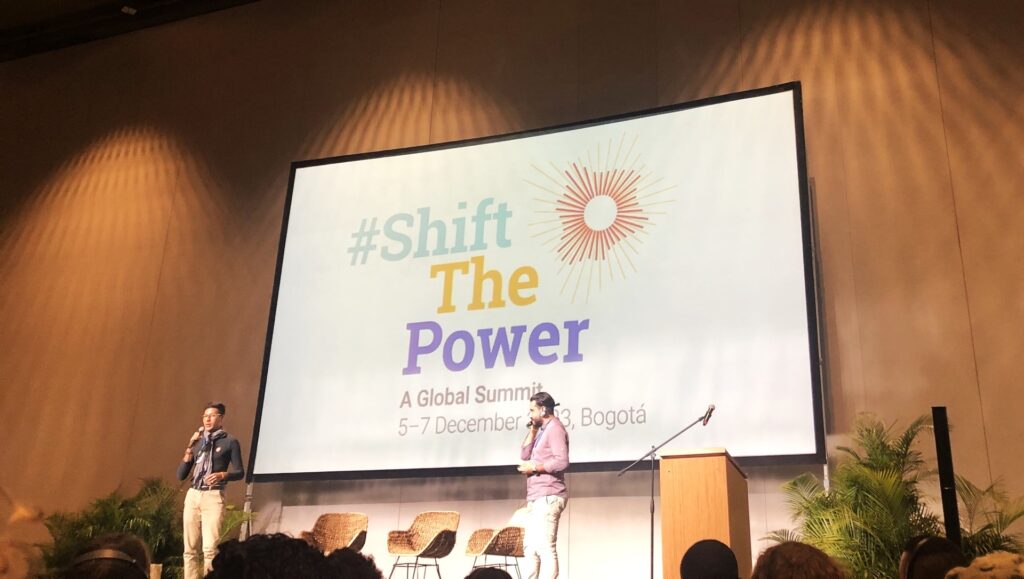
As Marie-Rose Romain Murphy of the Haiti Community Foundation, poignantly said in her address:
“Communities have been historically marginalised in the development process by governments and NGOs. Shifting power means recognising that local communities hold the solutions.”
During the conference, communities and practitioners who have been historically disenfranchised were front and centre. Throughout the discussions and sessions, we reflected on how as actors we can foster an enabling environment for change, avoiding window dressing and empty commitments.
In order for significant shifts to happen it is pivotal for organisations to re-examine their assumptions regarding where they stand in the sector. Developing self-awareness and defusing power dynamics within an organisation is helpful in ensuring that partnerships are genuine, built on trust, and free from exploitative practices. For international civil society organisations (ICSOs) changing the system entails not giving away power entirely, but rather engaging with it to progressively shift it to communities we aim to serve.
A key question that was discussed during the Summit was: Beside shifting power as a moral imperative, what does it mean for development and philanthropy actors to address the problem of power inequities?
Since 2018, the International Civil Society Centre’s Power Shift Labs have addressed the problem of power imbalances between Northern and Southern, but also between large and small, rich and resource-scarce entities of ICSOs. During the Labs, ICSO leaders explored the questions of how to overcome barriers and lead the necessary transformational power shifts in governance. Our goal is to prioritise the perspectives of the communities we serve by facilitating the exchange of lessons learned while supporting organisations in re-evaluating how they add value to a system that is infused with a colonial mindset.
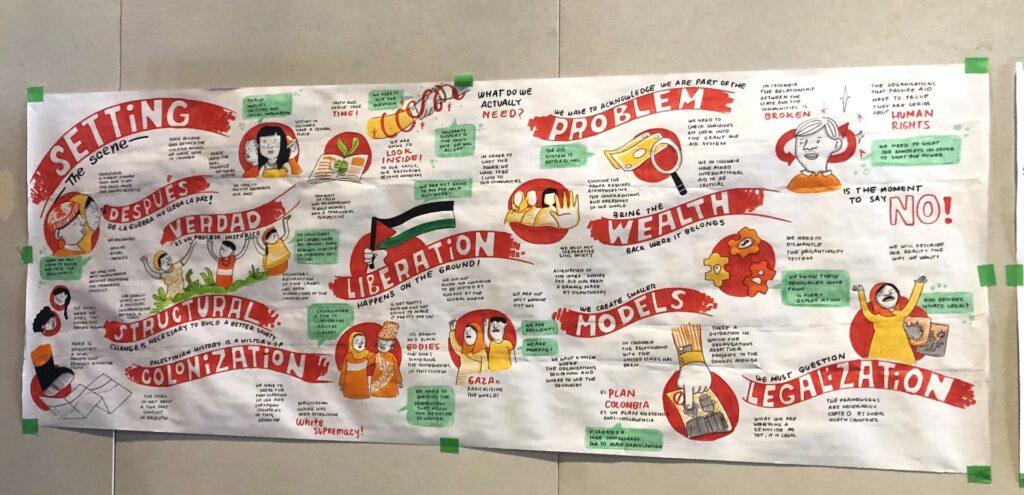
The Summit highlighted that the challenging and dismantling structures that perpetuate power imbalances is paramount to define the legitimacy of ICSOs in the civil society ecosystem.
Here are some of the reflections from the Summit on how organisations can start addressing power imbalances:
Power Shift cannot happen without mindset change
At the Summit, there were several discussions around the idea that before shifting power we need to shift culture and mindsets, and that requires individual reflections. Most dimensions that contribute to unequal decision making can be interpreted through an intersectional lens. To fight such inequalities, organisations should commit to identifying and eradicating the negative power dimensions that allowed such decision-making structures to develop and foster. Power imbalances are recognised as being not only an issue between Global North and South, but also across Southern, patriarchal power dimensions. All individuals working in the sector ought to ask themselves; how do you use power responsibly once you have it? How can we use our positionality and power to influence the sector to do better?
Concrete change requires strong sponsorship
In many organisations, there is a public commitment to being less colonial at internal and structural level and more conscious of power imbalances. While at macro-level, there is widespread agreement on the need to change and on such intent, there is a lack of vision of how to achieve change in the short-term, resulting in lack of consistent progress. In fact, while at a personal level, decision-makers might want to be de-colonial, they often struggle to transfer such commitment to the policy and strategy level. Finding sponsors for change within the organisation is crucial to implement such theoretical commitments and move from policy to concrete action.
There is a wealth of power in language and communication
The use of empowering language is a key tool to establish genuine and more equitable partnerships with communities, moving away from bureaucracy and flawed impact measurement to shared values and empathy for each other’s needs. Reflecting and being intentional about language also requires avoiding the co-option of the language of liberation, that radical groups have used to address the need to overhaul the system. Furthermore, while most organisations agree that decision-making should be moved to the closest point of impact, efforts to prioritise such commitments should be communicated better, creating safe spaces for critical and thought-provoking discussions.
We look forward to exchanging with organisations that endeavour to embrace this transformative mission despite the challenges. One of our key avenues to build momentum is the Power Shift Lab, which serves as a dedicated platform for a comprehensive review and assessment of the intricate interplay between power dynamics, organisational intent, and governance reform. This year’s Power Shift Lab, taking place on 10-12 June 2024 in Senegal in collaboration with Tostan, will focus on the intersection of governance transformations and shrinking civic space, delving into how such transformations affect local civil society. Connecting with local initiatives, we will further assess how to develop governance frameworks that facilitate the empowerment of local decision-makers in strategy, with the aim to dismantle the top-down decision-making structures that still pervade the sector.
If you are interested in participating in the event, want to find out more or keep up to date with our Accelerating Inclusive Power Shift initiative, sign up for our newsletter or reach out to Myriam Ciza Gambini, directly at mcgambini@icscentre.org

Myriam Ciza Gambini
Project Manager
International Civil Society Centre
Myriam coordinates the “Accelerating Inclusive Power Shift” project, which aims to foster equitable partnerships and more inclusive governance models in the development and humanitarian sectors. Prior to joining the Centre, she worked on EU development policy in Brussels for CONCORD and Humanity & Inclusion and with CBM in Italy.
Scanning the Horizon: Digital Doughnut

Every year, institutions release their trend reports. Recently, the World Economic Forum identified four different environmental issues as the most significant risks facing the world in the next 10 years. The UNDP Trends Report cites four climate-related trends in its top 13 themes. However, we know climate change is not merely a future trend, we are already feeling the damaging effects of climate change. February 2024 was globally the warmest on record.
The Scanning the Horizon Community, hosted by the International Civil Society Centre, investigates trends and signals affecting civil society and looks to apply this learning and approach to Civil Society Organisations. At the start of the year, the Scanning Community met to examine and explore those areas where digital technology and the environment converge.
We delved into a thought-provoking workshop to understand the intricate relationship between digital technologies and sustainability. Taking the Doughnut Economic Model – a framework, developed by Kate Raworth, that challenges traditional notions of economic success and sustainability, – we were able to use the ‘Digital Doughnut’, a visual tool that helped us explore the nuances of our digital footprint.
The Doughnut Economic Model offers a holistic approach to sustainable development. It visualises a “safe and just space for humanity,” represented by the area between the inner and outer rings of the doughnut. The inner ring denotes the minimum standards of well-being that every person should have access to, as outlined by the UN Sustainable Development Goals. Meanwhile, the outer ring represents the planetary boundaries we must not exceed to safeguard the health of our planet.
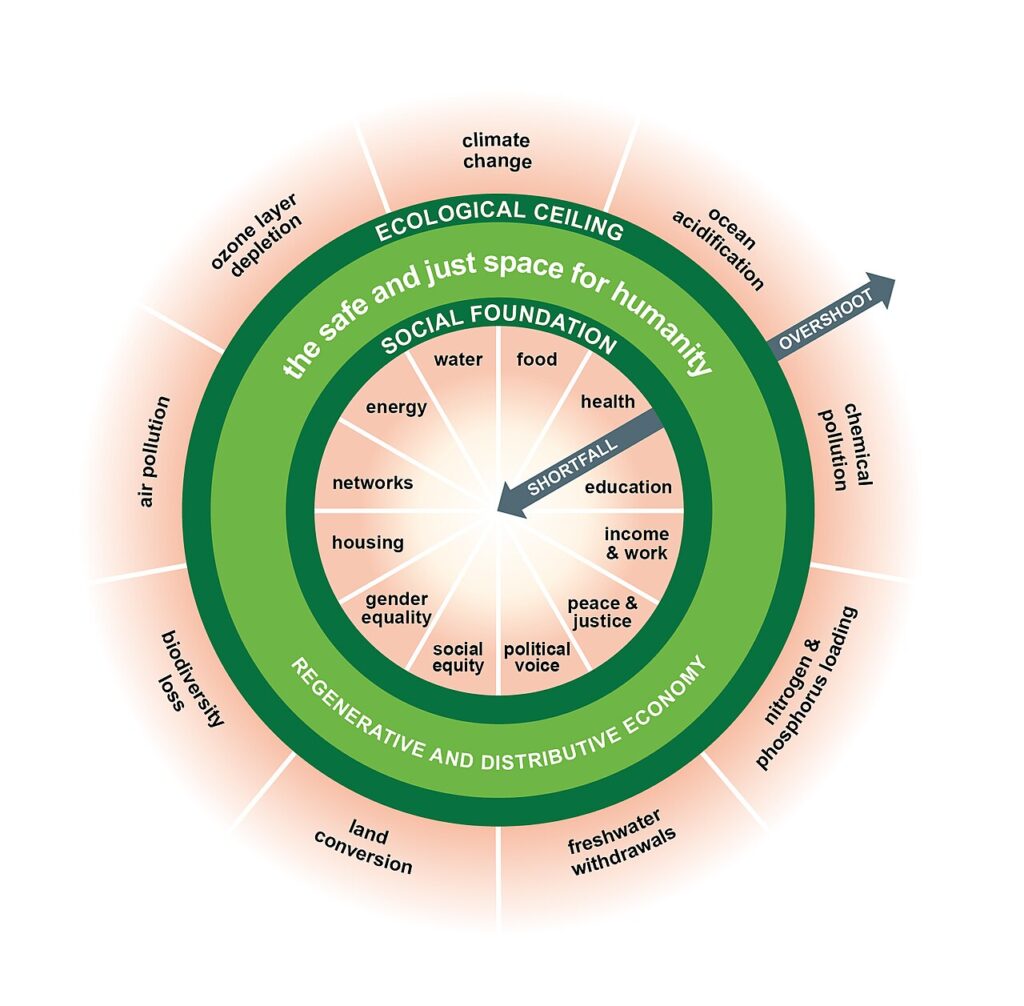
This model prompts us to consider not only the immediate impacts of our actions but also their long-term consequences on both people and the planet. By framing sustainability within this broader context, we are compelled to think beyond mere environmental conservation and examine the systemic issues at play.
The intersection of technology and sustainability is a pressing issue in today’s world. While technological advancements offer huge benefits, they also pose significant challenges to our environment and society. From the proliferation of electronic waste to the energy-intensive nature of digital infrastructure, the digital sector has a substantial ecological footprint. We do not always think about the physical and environmental infrastructure of digital technology. Cloud technology, for example, requires a significant amount of energy and waste. A Google data centre uses 450,000 litres of water per day. Training a single AI model can emit as much carbon as five cars in their lifetimes. There is often a hidden environmental cost to all this new technology.
The ‘Digital Doughnut’ takes the doughnut economy and uses the model to assess digital technologies. During our workshop, led by Alistair Alexander, participants examined the global impact of digital technologies and their implications for planetary health. We explored pressing topics like disinformation, e-waste, and energy consumption, shedding light on the multifaceted challenges we face.
In an era defined by rapid technological advancement and growing environmental concerns, the need for a more sustainable approach to digital development has never been greater. When we talk about sustainability in the tech realm, it is easy to focus solely on surface-level solutions like renewable energy and recycling. While these are crucial steps, we must not lose sight of the deeper questions. What are the underlying paradigms and systems driving climate change? How is digital technology contributing to this crisis and what fundamental changes are needed?
You can find out more about the Digital Doughnut here: https://doughnuteconomics.org/ and here: https://reclaimed.systems/The-Digital-Doughnut or contact Alistair directly.
At the heart of our efforts with Scanning the Horizon is collaboration with our members and partners to bolster future literacy within the sector. We are actively engaged in charting and anticipating emerging trends.
Our Scanning the Horizon Community unites professionals from diverse sectors to share knowledge, and expertise, and test novel methodologies. Please email us if your organisation is interested in gaining more insight into our community as part of its foresight work. We look forward to hearing from you.
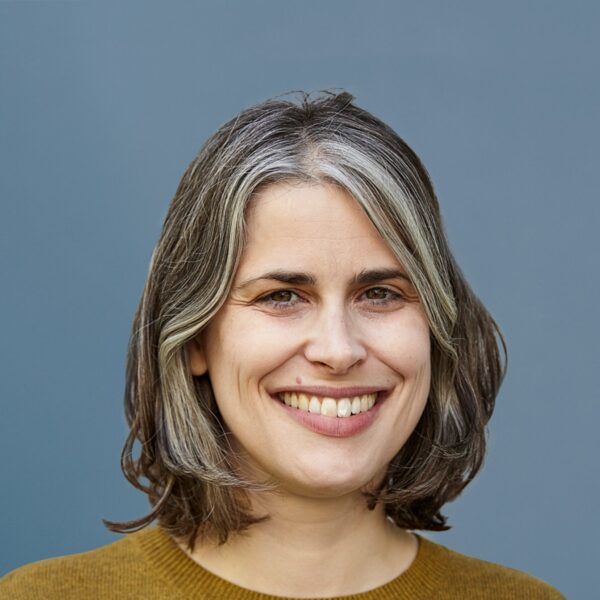
Rachel Wilkinson
Programme Manager – Futures and Innovation
International Civil Society Centre
Rachel leads the Futures and Innovation programme at the Centre. She is responsible for managing the portfolio of projects and events as well as leading and developing the Scanning the Horizon strategic peer learning platform. Rachel has more than 15 years of experience working in the third sector, on a national and international level, working for various ICSOs in international development and human rights in both London and Berlin.
Anticipate, Adapt, Act: Shaping a resilient future for civil society

It is widely understood that the civil society sector faces undue restrictions and threats to its operating space globally. To help strengthen the capacity of civil society actors, we need to develop the ability to anticipate the future and act in a proactive manner to shape the future. The International Civil Society Centre and Forum for the Future recently collaborated on this issue at the International Civic Forum (ICF) 2023, a two-day workshop in Brussels joined by 40 actors from across the civil society sector.
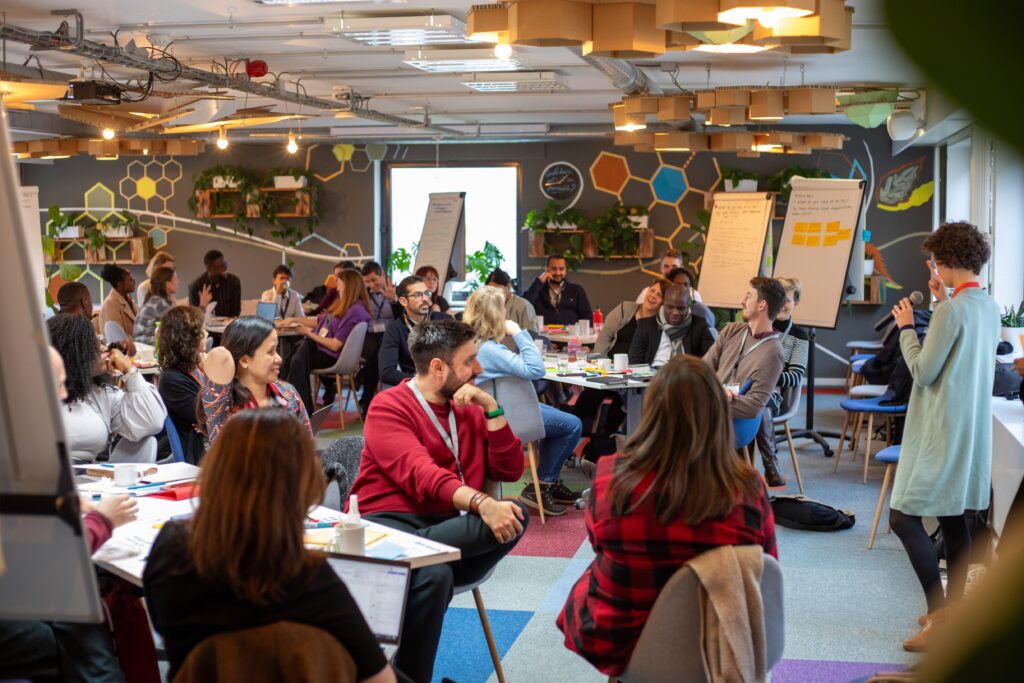
How do civil society organisations (CSOs) accustomed to fire-fighting crises imagine more adaptative and agile ways of preparedness and planning?
In mid-2023, we joined efforts to design a replicable methodology that offered a creative and engaging way to use future stories and scenarios leading to 2034. The purpose of this was to help CSOs design current and future strategic plans and inform their practices. The objectives offered participants a way to explore a range of possible futures and identify potential action areas to navigate those varied futures on three distinct levels: as individuals, organisations, and as a sector. We hoped to use the ICF 2023 to test the methodology and receive feedback on how it can be developed to support future planning for CSOs.
The sessions took the attendees on a journey… first immersing them in the present and exploring current trends, then travelling to alternative possible futures based on the set of trends, and finally bridging the gap between possible futures and their actions, resources and mindsets. While the workshop surfaced several sectoral actions, the sessions were designed to ensure a focus on the attendees present and their specific agency and role in driving the change needed.
How could they as individuals in their respective roles contribute to their organisation’s resilience? And how could their organisation work with others to reduce sector-wide vulnerability?
We designed the sessions to be generative spaces that led the group to bring their experience and expertise while stretching beyond what exists in the present and imagining more ambitious (yet tangible) actions for possible futures.
“As CSOs, we need to get used to ‘futurising’ as this informs current actions and helps us to avoid ‘routinising’.” ICF participant

The participants produced a range of ideas at the sectoral, organisational, and individual levels that we summarised below:
Sector-wide actions
- We need to empower and involve local communities
Anticipation is about participation and if we want to build a better future, we need to listen to local communities, invest in community relations, and change approaches to collaboration. Local partners need to be involved from the beginning of processes; communities need to be turned into co-investors and co-designers rather than receivers.
- The language we use needs to shift to remove barriers to involvement
As raised by a participant and echoed by many around the room, the language around development is “colonial-centric”. It is often in English, French, or Spanish and filled with jargon that can be difficult to interact with. How can we expect to involve people in decision-making and hear their voices, if the language or medium of conduct is inherently exclusionary? For communities – and the youth in particular – to be deeply involved, we need to think about access to such spaces and especially the language we use.
- We need to apply a more holistic approach and deepen collaboration on intersectional problems
The challenges we face in the civil society sector are complex and interconnected, and therefore require intersectional approaches. Rather than approaching challenges in isolation, we can use a similar concept to the “whole child approach” or “one health approach” to recognise intersectional identities, needs, and experience.
- We need to craft futures across the civil society sector and together with other sectors
Foresight needs to be ‘humanised’ and made approachable. It was viewed by many as a key skill to prepare for the future, and therefore needs to be done by a wider range of stakeholders. Thinking about the future is inherently a human act. Instead of approaching uncertainty with the usual sense of fear, foresight allows us to plan and stress test approaches against potential futures in a more informed manner.
“The process led to some ‘aha’ moments for me which will have a significant impact on my planning.” ICF participant
Organisational actions
The participants worked in pairs or peer groups to draft tangible organisational plans they can contribute to. The ideas revolved around two aspects:
- Strengthening participation and inclusiveness in decision-making processes International and local CSOs need to invest more into co-creation, reflection, and exploration of alternatives with partners and communities.
- Building foresight capacities and applying foresight within organisational activities
The participants left motivated to involve their colleagues, partners, and allies in further collaborative foresight processes and exercises.
Individual actions
Building foresight capacities and their application were further underlined in concrete individual actions that the participants expressed their interest in developing such as:
- Promoting and prioritizing knowledge sharing about foresight to broaden perspectives
- Planning a foresight exercise for colleagues to strengthen organisational capacities
- Integrating futures thinking into existing processes and upcoming strategies
The individual actions identified during the ICF 2023 underscore the importance of fostering foresight at multiple levels — empowering local communities, shifting organisational language, and humanizing foresight for broader stakeholder engagement to ensure plans, projects, and strategies reflect our hopes for the future.
“Futures thinking is a systemic process and should be given due attention.”
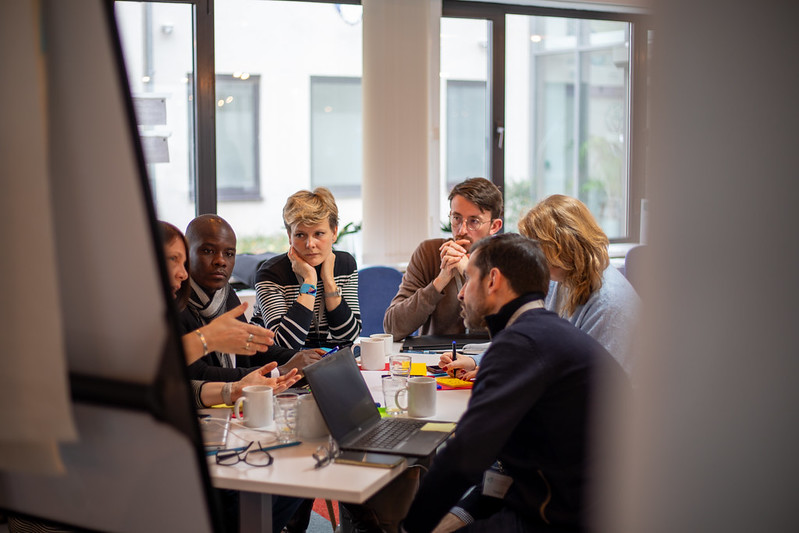
So, what does this mean?
Being a systemic process, futures thinking should be approached comprehensively, considering all interconnected aspects. In essence, it means recognising the need for a thorough strategy when addressing global challenges in the civil society sector. By practicing futures thinking, we take a proactive stance in tackling the complex issues faced by the sector, while fostering resilience, collaboration, and inclusivity. It is about developing the capacity to not only monitor trends but also to envision, through a participatory approach, how they might unfold providing us with a powerful tool to break away from conventional crisis management practices. Futures thinking urges us to be strategic, forward-looking, and adaptable in our approach, ensuring a more effective response to the evolving landscape of the civil society sector.
Find out more
The ICF 2023 was part of a wider three-year initiative “Anticipating futures for civil society operating space” (2022 – 2025) led by the International Civil Society Centre. The initiative aims to strengthen anticipatory capacities and future readiness of civil society professionals who are working to defend and expand civic and civil society operating space. Check out this website to find further information and resources from this initiative and possibilities of involvement.
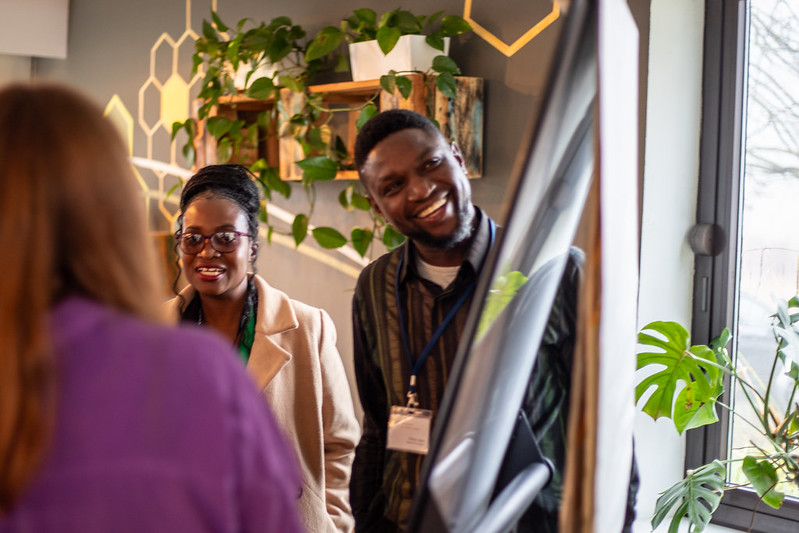
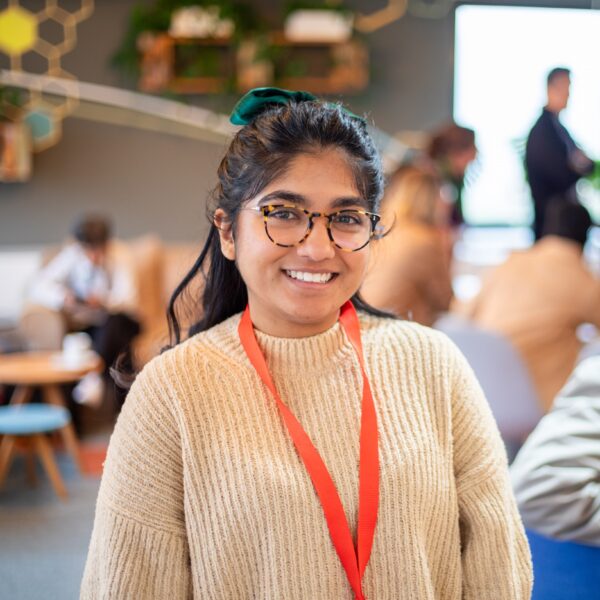
Mareyah Bhatti
Change Designer
Mareyah is a Change Designer at Forum for the Future, with an academic background in medical geography and personal passion for food systems and their cultural significance. She works closely in the Food and Futures teams at Forum, managing and delivering their programmes. She was recently seconded to Singapore for the 'Protein Challenge Southeast Asia,' a runner-up for the esteemed Food Planet Prize. Beyond this, Mareyah contributes to Forum’s Future Centre platform as an editor, identifying emerging signals and authoring blogs on topics from the future of protein to human rights in the fashion supply chain.
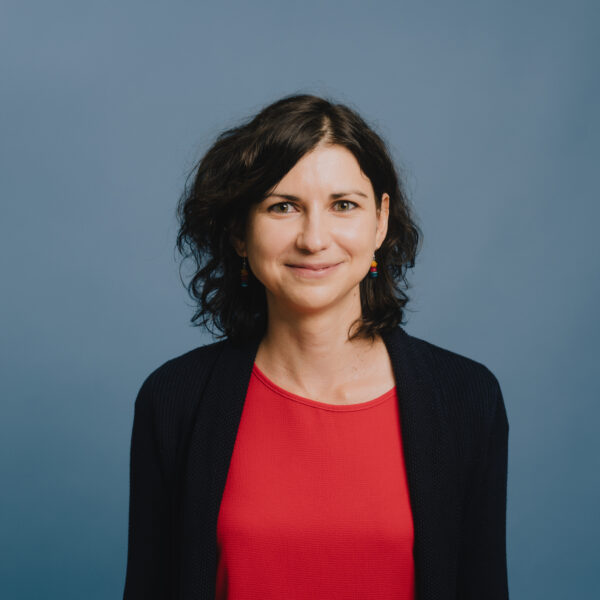
Eva Gondor
Senior Project Manager
International Civil Society Centre
Eva leads on the Centre's civic space work - the Solidarity Action Network (SANE) aimed at strengthening resilience of and solidarity among civil society actors, and the International Civic Forum (ICF), our annual civic space platform to network and identify opportunities for collaboration. Prior to joining the Centre she worked at the Robert Bosch Stiftung (Foundation) in Stuttgart where she managed the foundation’s projects focusing on civil society and governance in Turkey, the Western Balkans, and North Africa.
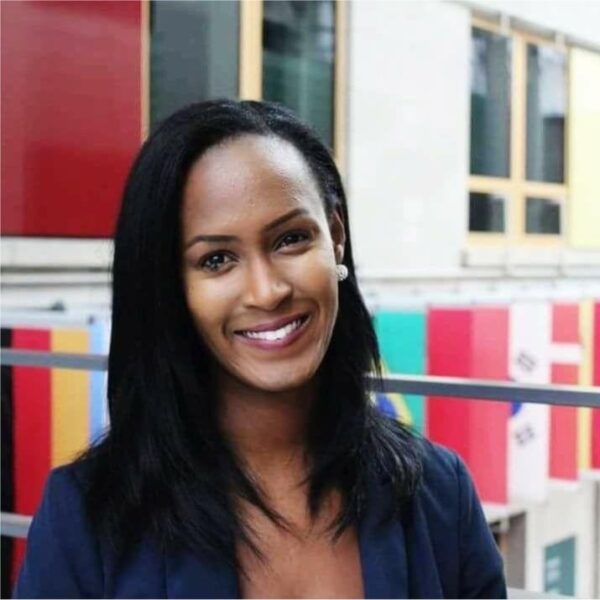
Patricia Mugenzi
Strategic Foresight
International Federation of the Red Cross and Red Crescent (IFRC)
Patricia is the coordinator for Strategic foresight (Africa Region) at the International Federation of the Red Cross and Red Crescent (IFRC). She helps IFRC’s National societies explore possible futures to address upcoming challenges. Before joining the IFRC, Patricia served in various positions in both international and governmental organisations, including the Government of Quebec. In this role, she provided invaluable insights and guidance on geopolitical matters, playing a pivotal role in shaping government policies and strategies.




